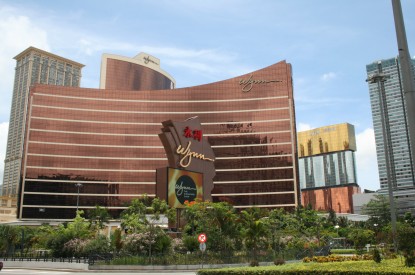Supplier News
China – Wynn rocked by inside junket job
By Phil - 18 September 2015
Hong Kong-based investment bank Daiwa Capital Markets has informed that up to $US258m has been stolen from a VIP room operator in inside Wynn Macau.
Wynn Macau’s shares fell by nine per cent on the news casino.
Daiwa said: “Staff at Dore Holdings, a VIP room operator in Macau, have allegedly fled with between HKD200m and HKD2bn.”
Dore Holdings, the VIP operator at the centre of the scandal, has stated that the alleged theft is not directly related to the company.
A Wynn spokesperson said: “The current reported concerns with respect to Dore, one of Wynn Macau’s junket operators, have no direct financial impact on Wynn Macau. Dore owes no money to the company and continues to operate in Wynn Macau. Dore is an independent, registered and licensed company operating a gaming promoter business at Wynn Macau the company hopes that all parties will be able to resolve their differences in the near future. The company will continue to monitor the situation”
The theft follows a similar story in April 2014 when a VIP room operator, named Kimren, stole between HKD8bn and HKD10bn.
Daiwa, Analyst Jamie Soo said: “As a whole, the junket segment never recovered from this liquidity squeeze since [the Kimren incident]. We are already seeing signs of this today, with individuals purportedly rushing to the junket (Dore) in an attempt to withdraw funds. Wynn may still face some form of bad debt in the event that the junket’s remaining capital base is unable to absorb the loss. Continued junket closures are a real possibility, and as previously highlighted, we have already witnessed an acceleration of junket closures in the past two months. There are at least 11 VIP rooms slated for closure.”
Dore investors protested outside Wynn Macau following the theft, demanding their investments back from the junket.
Credit Suisse claims that Dore generated around four per cent of Wynn Macau’s annual earnings before interest, taxation, depreciation and amortization (EBITDA).
“Even if we conservatively assume the [Dore] business dropped by half, its annualized EBITDA impact would be HKD120m, or two per cent of our expected HKD5.2bn EBITDA for Wynn Macau in 2015,” it said.
Union Gaming Analyst Grant Govertsen is doubtful that the money was ever in Wynn’s control or evenm on Dore’s books so ‘therefore does not represent a loss of liquidity.’
“It is important to remember that the junket financial system is not anywhere near as sophisticated as western financial systems and instead is largely based on the Chinese system of “guanxi” which, simply put, is a relationship/trust system (i.e. somebody vouches for the trustworthiness of an individual or a company). As such, it becomes easier for fraud to be perpetrated,” he said. “Based on conversations we’ve had with the junket community here in Macau, we believe the following scenario could have occurred: Individuals “invest” money in Dore. Instead of placing the investor funds into the junket’s pool of liquidity, the cage manager, Ms. Chow, diverts these funds to an account she controls – in other words, these investments never were recognized or received by Dore even though she could have issued official looking receipts. An investor subsequently decides to redeem his/her money from Dore and is told there is no record of him/her as being an investor in Dore. Alarm bells start going off as Dore begins to understand what transpired, which results in their police report being filed. Word begins to spread within the community and many investors start approaching Dore to enquire about their investments and some are refused (i.e. their funds were fraudulently disposed of) while others are confirmed to be true investors (i.e. their funds were actually put into Dore’s pool of liquidity). Confusion ensues, the media takes notice, and shares sell off.”



